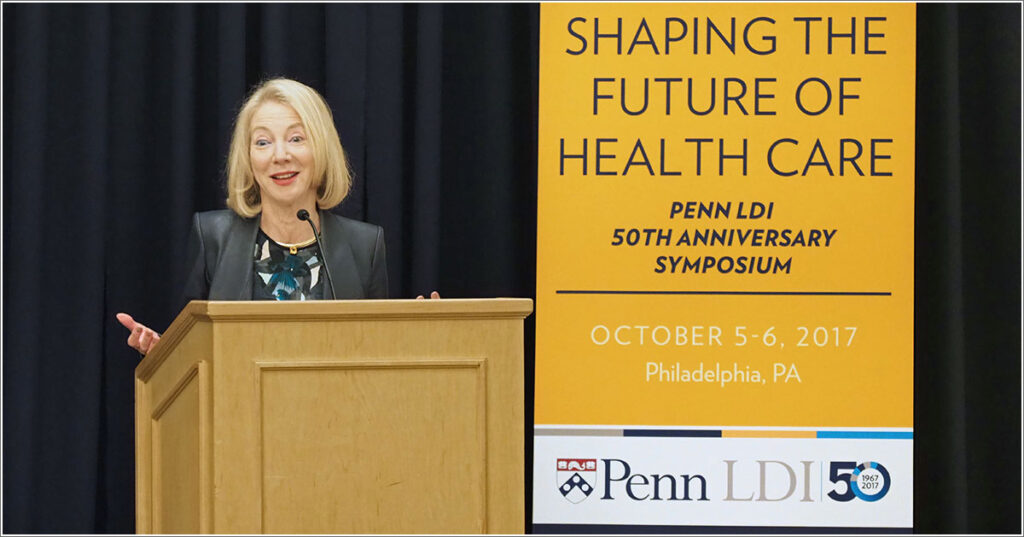News
Penn President’s Address to LDI 50th Anniversary Symposium
Amy Gutmann Cites Knocked Down Barriers and Bridged Health Care Disciplinary Divides

“If the Leonard Davis Institute of Health Economics did not exist, we’d have to create it” to meet the health services research challenges of today’s health care, said University of Pennsylvania President Amy Gutmann in her address to the LDI 50th Anniversary Symposium. Click image for larger.
As she began her address at LDI’s 50th Anniversary Symposium, University of Pennsylvania President Amy Gutmann cited a reflection by former Secretary of Health Education and Welfare Joseph Califano, Jr., that “just as war is too important to be left to generals, so medicine is too important to be left to the doctors.”
At the end of the 1970s when she was a young professor at Princeton, Gutmann, PhD, said she became increasingly interested in the ethical issues of health care and wrote a 19-page essay for the Milbank Memorial Fund Quarterly entitled, “For and Against Equal Access to Health Care.” It looked far beyond doctors to explore many of the concepts involved in making health care available to all citizens.
“Words like ‘medicine’ and ‘health care’ were no longer interchangeable,” Gutmann said. “The profession of medicine had been subsumed by the very sophisticated, multifaceted juggernaut of U.S. health care.” Annual costs then had risen to about $550 billion or 12% of GDP.
‘Essential role’
“Fast forward from then to 2016 when this country spent $3.4 trillion or nearly 20 percent of GDP on health care,” she continued. “Controlling for inflation, that’s a leap of nearly 200% in just three decades and that brings me to this symposium and the essential role of the Leonard Davis Institute.”
“We have our doctors. We love our nurses. We have them rigorously trained, licensed and certified. We love the best doctors and nurses and health care professionals right here at Penn,” she said. “But indeed, it is not for the medical profession alone or the nursing profession alone or any profession alone to tackle the incredibly complex challenges and opportunities of American health care.”
“To bring such a monumental understanding and such a monumental undertaking together,” Gutmann continued, “we don’t just need an interdisciplinary approach. We need interdisciplinary brilliance and I don’t say that lightly. We need the Leonard Davis Institute. We talk about knocking down professional barriers and bringing disciplinary divides together to address complex issues and other great breakthroughs. How incredible is it then, that the LDI began doing this a half century ago? You know in business they talk about the ‘first mover advantage.’ There is an incredible advantage to having begun a half century ago. By establishing the institute, Leonard and Sophie Davis exemplified a rare prescience for tackling issues that have grown even more urgent in our time and over time. This symposium has talked about innovation and disruption, value and risk, access and cost, quality and quantity, politics and policy. These issues combine to create the pressing now and tomorrow of health care.”
Affordable access challenge
“Never has there been a greater challenge of how to provide affordable access and how to provide that consistently with the innovative engine that is also represented at this university and across society,” she said.
“No institute in this nation is better situated to do this than LDI,” Gutmann said. “It is essential to Penn’s work and brings together world class expertise from Penn Medicine, Wharton, Nursing, Dental, Law and Annenberg, with links to Arts & Sciences, the Graduate School of Education, Social Policy and Practice, and Penn Vet.”
“There is no other major university, not only in this country, but in the world,” she continued, “that has those kinds of linkages and celebrated senior fellows as well. LDI has for decades pioneered the interdisciplinary pursuit of evidence-based policy and better understanding of health care’s thorniest challenges and greatest opportunities. So, when it comes to undertaking the necessary work, there’s no place like Penn.”
Gutmann discussed the waves of headline recently generated around the U.S. as well as the rest of the world by recent dramatic breakthroughs at Penn in the use of genomic immunotherapies to treat cancer.
‘Interdisciplinary experts’
“Soon after,” she explained, there were also headlines not just for this therapy but for a host of innovative — some life-saving, others life-extending — therapies. And while I was reading that coverage, the unique and pivotal role not only of Penn generally but of LDI specifically came to my mind. Above the fold, Penn doctors, nurses, researchers and clinicians were bringing revolutionary cancer treatments to the world. And in the next paragraph Penn’s interdisciplinary experts who serve as LDI Senior Fellows were weighing in on absolutely pressing matters of access and affordability.”
“LDI’s exceptional influence in health care issues ranges incredibly widely,” she said. “Just consider Mark Pauly who was so rightly honored at last night’s dinner for his incredible scholarship and mentorship. He’s a prime mover in shaping national health care policy. For all these reasons and more, for all the expertise that’s assembled here, and the brilliant minds who participated in this symposium, it’s clear to me that LDI will help shape the future of health care just as it’s pioneered the past. LDI is leading the way on a range of emerging issues — the opioid crisis, innovative treatment such as immunotherapy, debates on Medicaid and access, evidence-based progress toward a high value health care system, and long-term care for an aging population.
‘We’d have to create it’
“So the highest praise I can give LDI is this,” Dr. Gutmann said. “If the Leonard Davis Institute didn’t exist we’d have to create it. And it would be a hell of a lot harder to create it today given how much it has done over the last 50 years. So, I’m so pleased and proud that the LDI does exist and as much as I admire your accomplishments to date, Dan (Polsky, LDI Executive Director) and Senior fellows and faculty and assembled experts, my expectations for the future are even higher. The stakes are even higher. It is really important for the future of our lives and the lives of our children and grandchildren that LDI continues to do this great work.”
